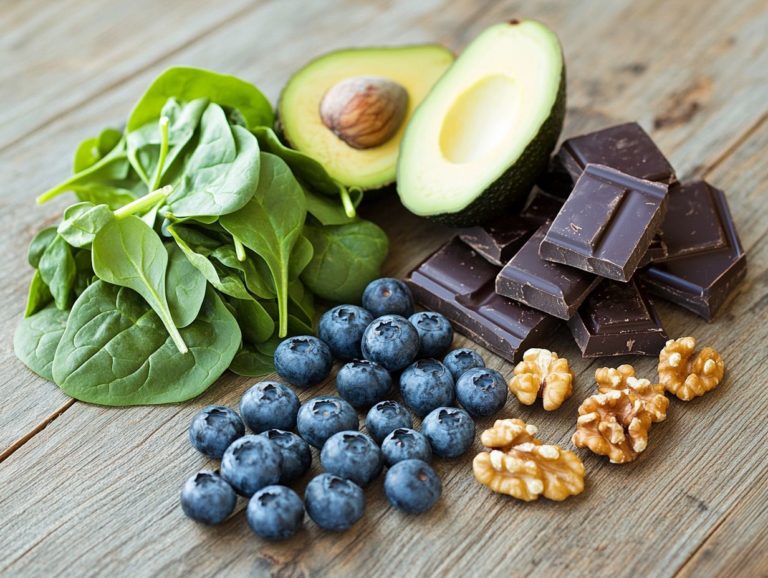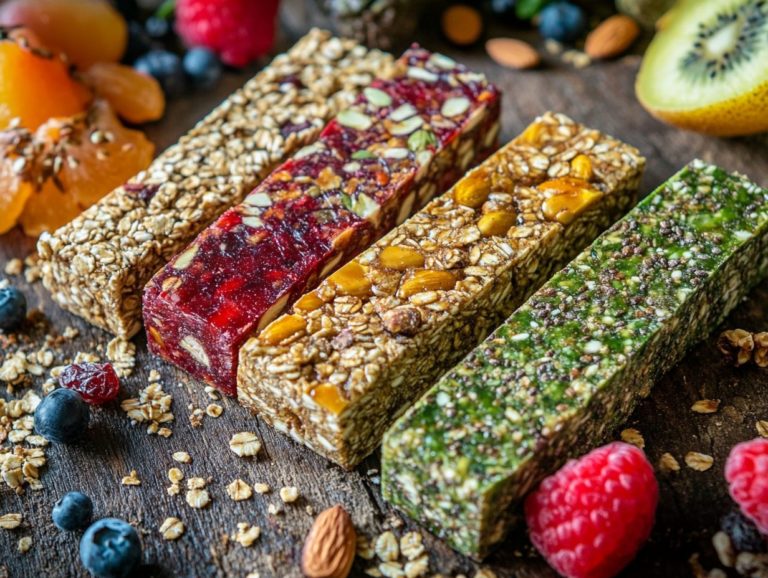Why Nuts are Considered Superfoods
Nuts have rightfully earned their status as superfoods, boasting impressive nutritional profiles and a myriad of health benefits!
This article clarifies what qualifies a food as a superfood while delving into the exceptional qualities of various nuts. You ll discover essential nutrients that not only support your overall well-being but also play a significant role in reducing the risk of chronic diseases and assisting with weight management.
Nuts truly offer a wealth of advantages. You ll also find tips on seamlessly incorporating these powerhouse snacks into your daily diet. Adding nuts to your meals can truly be a game-changer for your health!
Contents
Key Takeaways:
- Nuts are considered superfoods due to their high nutritional value and health benefits.
- Regular consumption of nuts can help reduce the risk of chronic diseases and aid in weight management.
- Including a variety of nuts in your diet can provide unique health benefits and can be easily incorporated into meals and snacks.
Understanding Superfoods
Superfoods are nutrient-dense powerhouses that provide remarkable health benefits, brimming with essential nutrients, antioxidants, and natural compounds. When you incorporate these foods into your diet, they can help you achieve various nutritional goals, bolstering your overall wellness and energy levels while aiding in weight management.
Typically sourced from plants, these superfoods offer advantages like improved heart health and decreased inflammation. They are essential elements of sustainable eating practices that pave the way for long-term health enhancement.
Defining the Term and Criteria for Inclusion
The term ‘superfoods’ refers to those exceptional, nutrient-dense foods that deliver remarkable health benefits, characterized by their high concentrations of antioxidants, vitamins, and minerals.
These foods aren’t just about being nutritionally dense; they play a vital role in enhancing your overall well-being. To earn the title of superfood, a food must boast a remarkable array of essential nutrients, including fiber, healthy fats, and phytochemicals (natural plant compounds that benefit health).
Take blueberries, for example. They are celebrated for their powerful antioxidants, which help fend off oxidative stress. Quinoa, on the other hand, shines with its complete protein profile, making it a fantastic choice for vegetarians. Foods like spinach, packed with iron and calcium, support bone health and boost energy levels.
By incorporating a variety of these nutrient-rich options, you can significantly elevate your dietary habits and embrace a healthier lifestyle.
Nutritional Benefits of Nuts
Nuts stand out as some of the most nutrient-dense foods at your disposal. They offer a remarkable source of healthy fats, plant-based protein, fiber, and essential vitamins and minerals. Their distinctive nutritional profile features heart-healthy monounsaturated fats and omega-3 fatty acids, crucial for maintaining cardiovascular health.
The bioactive compounds and L-arginine found in various nuts play a significant role in reducing inflammation and promoting overall well-being. Incorporating them into your balanced diet can elevate your nutritional game to new heights.
Rich Sources of Essential Nutrients
Nuts are your go-to for a wealth of essential nutrients, offering healthy fats, antioxidants, and plant-based protein that are vital for maintaining optimal health and well-being.
These little powerhouses are rich in heart-healthy monounsaturated fats, which help lower bad cholesterol while elevating good cholesterol. Take almonds, for example; they’re particularly high in vitamin E, an antioxidant that plays a crucial role in cardiovascular health by safeguarding blood vessels from oxidative stress.
Then there are walnuts, brimming with omega-3 fatty acids, celebrated for their anti-inflammatory properties and their potential to reduce the risk of heart disease. By incorporating a variety of nuts into your diet, you not only elevate the flavors of your meals but also significantly bolster your overall dietary goals.
They provide a satisfying source of nutrition that is both convenient and incredibly versatile.
Start incorporating nuts into your daily diet today for maximum health benefits!
Health Benefits of Eating Nuts
Incorporating nuts into your daily routine can offer a wealth of health benefits, especially when it comes to reducing the risk of chronic diseases like cardiovascular issues and diabetes. Regular nut consumption lowers cholesterol levels and aids in healthy weight management, making them an ideal addition for anyone aiming to embrace a heart-healthy lifestyle.
These nutrient-rich foods enhance your overall well-being and play a crucial role in crafting a balanced nutritional plan.
Reduced Risk of Chronic Diseases
Regularly indulging in nuts is linked to a decreased risk of chronic diseases, particularly cardiovascular issues. This benefit arises from mechanisms like cholesterol reduction and improvements in metabolic syndrome parameters.
Research shows that integrating various nuts such as almonds, walnuts, and pistachios into your diet can lead to significant reductions in LDL cholesterol levels, improving your overall lipid profile. A meta-analysis published in the American Journal of Clinical Nutrition revealed that consuming nuts correlates with a 5% decrease in total cholesterol and a 7% reduction in LDL cholesterol.
The anti-inflammatory properties of nuts, due to their abundance of antioxidants and healthy fats, combat inflammation associated with metabolic conditions. Eating nuts regularly can boost your heart health and help you live longer!
Weight Management and Satiety
Nuts are powerful allies in weight management, promoting satiety and helping you control caloric intake when enjoyed in moderation as healthy snacks.
Packed with healthy fats, protein, and fiber, these nutrient-dense foods provide a satisfying experience that curbs hunger and reduces the likelihood of overeating during meals.
If you’re looking to incorporate nuts into your daily routine, consider adding a small handful to your breakfasts, snacks, or salads. This simple adjustment can help maintain caloric balance while enriching your diet with essential nutrients. Just remember, the key lies in portion control harness their benefits without exceeding your daily caloric needs.
Types of Nuts and Their Unique Qualities
You ll find a diverse selection of nuts, each boasting unique qualities and health benefits. Consider walnuts, almonds, pumpkin seeds, chia seeds, and flaxseeds. They re not just tasty snacks but also outstanding sources of protein that can elevate your healthy diet.
Comparing Nutritional Profiles
When comparing the nutritional profiles of various nuts, you’ll notice significant differences in their healthy fats, protein, and essential nutrients.
- Almonds: Packed with monounsaturated fats and an excellent source of vitamin E.
- Walnuts: High in omega-3 fatty acids, beneficial for heart health.
- Peanuts: Technically legumes, they provide substantial protein and folate.
- Hazelnuts: Offer a unique balance of fiber and magnesium, promoting digestive health.
A detailed chart can effectively illustrate these differences, enabling you to make informed dietary choices tailored to your nutritional needs.
Incorporating Nuts into a Healthy Diet
Incorporating nuts into your healthy diet is straightforward and immensely rewarding. It opens up a world of delightful and nutritious meals and snacks, enhancing your overall well-being.
Are you ready to discover the amazing benefits of nuts? Start adding nuts to your meals this week and feel the difference!
Tips for Adding Nuts to Meals and Snacks
Incorporating nuts into your meals and snacks is an excellent way to enhance both nutritional value and flavor. This supports a heart-healthy diet while helping you achieve your nutritional goals.
By adding a variety of nuts think almonds, walnuts, and pecans you can elevate the taste and texture of everyday foods.
For breakfast, why not sprinkle some chopped walnuts into your oatmeal or blend almonds into your smoothies for a creamy touch? At lunchtime, toss a handful of toasted pine nuts into your salad to add a delightful crunch along with essential omega-3 fatty acids.
When it’s time to snack, consider making a trail mix with dried fruits and mixed nuts! This not only curbs your hunger but also provides vital vitamins and minerals.
These small yet meaningful adjustments ensure your meals aren t just nourishing but also tantalizing for the taste buds. Make healthy eating a truly enjoyable and sustainable journey!
Frequently Asked Questions
Why are nuts considered superfoods?
Nuts are considered superfoods because they are packed with essential nutrients and offer numerous health benefits. They are a valuable addition to any diet.
What makes nuts a superfood?
Nuts are rich in healthy fats, protein, fiber, vitamins, and minerals. This makes them a nutrient-dense food that can improve overall health and well-being.
How do nuts benefit our health?
Research links nuts to a reduced risk of heart disease, improved brain function, weight management, and a lower risk of certain cancers. They are a valuable addition to a healthy diet.
Which types of nuts are considered superfoods?
Nuts such as almonds, walnuts, cashews, pistachios, and peanuts are all considered superfoods due to their high nutrient content and various health benefits.
Can nuts help with weight loss?
Despite being high in calories, nuts can actually aid in weight loss due to their high protein and fiber content, which helps keep you feeling full and satisfied. Just be sure to watch portion sizes.
How can I incorporate nuts into my diet?
Nuts can be enjoyed as a snack on their own or added to salads, oatmeal, and yogurt. You can even use them in baking or cooking as a healthy ingredient substitute. Get creative and experiment with different types of nuts to find your favorite ways to enjoy them!
Start today for a healthier you!






